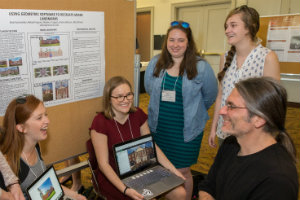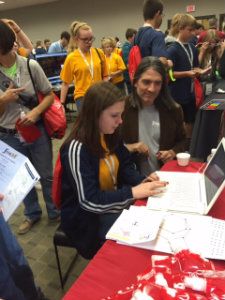Reframe Podcast: Episode 32

Meaningful Math Education

James Loy:
This is Reframe, The podcast from the College of Education, Health and Society on the campus of Miami University in Oxford, Ohio.
To a lot of people, math is notorious for seeming like it’s tedious, difficult, and even a scary subject. But according to Todd Edwards, a professor of mathematics education, it doesn’t have to be. His goal is to make math meaningful by connecting it to the lives of his students in ways that matter. He is also a big fan of writing, which he uses to teaches the historical and cultural sides of math.
Recently, we met at new café on campus to talk more about is unique approach to math education
(MUSIC FADE)
(Background: Coffee shop noises and student ambiance
Todd Edwards:
. . . This is a good segue. I have been inspired by . . . My two biggest inspirations here at Miami have been Tom Roman and Thom Poetter. Both of them have really engaged their students in writing. And I was a math major here by trade. But I love writing. I have sort of discovered my writerly self while I’ve been here at Miami. So both of those characters have been instrumental in helping me re-envision what writing is and how it might play a role in preparing future math teachers.
James Loy:
That seems almost like . . . I don’t think many people would correlate those two, math and writing . . .
Todd Edwards:
Yeah. I am teaching a class called Mathematics History and Technology. And we are doing something new. I had this idea to author original children’s picture book biographies of mathematicians.
Right now we are just in the . . . I am writing a picture book as well. It is remarkable to me how much is involved in writing one of these and doing a lot of research about the mathematician. We are collaborating with a middle school classroom here at Talawanda Middle school with someone named Lori Gloeckner. Lori and I are writing one of the math biographies as well, to model for my students.
Then we are connecting middle school six graders to the preservice teachers in my class. The books have to incorporate mathematics in them in a meaningful way. So the mathematics has to be written in such a way that honors what the mathematician did. But also honors the way that six graders learn. So it is really a balancing act. But there is a ton of mathematics involved to . . . and math teaching . . . to understand the research that the mathematician did, to convey it in a way that the kids understand. Then the technology of putting together the book.
James Loy:
That seems pretty cool. Who is the mathematician that . . . can you talk about who you choose to focus on and write about?
Todd Edwards:
Yeah, for sure. The mathematician we picked is a recent fields medalist. There is no math Nobel Prize. There is this thing called the Fields Medal and the mathematician we are looking at won the Fields Medal. She Iranian. Was born in 1977. Grew up . . . was born literally right before the revolution and so her life is just an amazing one. She grew up during that turbulent time of that change.
Where do I begin. She’s such an inspiration in terms of her courage. She was told as a middle school student that she was an average math student and really discouraged from studying math for a while. And then she had a teacher in high school who helped her catch fire. Helped her stoke her passion for mathematics. And she was the first women to come in first place in this international competition. I think it was the Mathematics Olympiads. She got a perfect score on this exam. It’s unbelievable.
And then goes on to win the Fields Medal and then develops breast cancer at the age of 40 and passes away. And so part of my research was looking at her funeral service. It was an hour and a half long. These people were talking about her life and how inspirational she was. So powerful. Truly pushing the boundaries for what it is possible for women to do in the world and it transcends mathematics.
James Loy:
I was gonna say, it’s about acceptance too, and breaking down cultures barriers and . . . I think that also gets to more of the way math can be more culturally focused, but also the ways it can be more relevant too. Like, I read your story . . . or your article about the Cookie Conundrum, which was the . . . after the viral news story reported that Double Stuf Oreos weren’t actually twice as much filled with cream filling. And then actually taking that story into your class and actually testing that, which lead to critical inquiry and taught rigorous data collection and statistical analysis. And, in a way, almost media literacy too. To, you know, not believe any viral news report that we may see. So . . . I don’t know. I feel like it’s such a great way to explore such a range of concepts that aren’t as, you know, dry and sterile as just breaking down numbers and equations on a white board.
Todd Edwards:
Maybe, generally, that’s my mission in life, to encourage future teachers to connect their instruction to things that matter to kids. When I was in school math was often taught devoid of any context. You know, I have to factor this polynomial.
And it was sterile. It was pure. I mean there were some appealing things in that to me because I am kind of a geek. But it is so much more compelling when it actually matters.
So. That’s my goal as an instructor, is to encourage the teacher candidates to consider instruction that makes mathematics meaningful to their students. And so talking to students and figuring out what matters to them and building instruction based upon that.
James Loy:
How are some other ways that you do that? Obviously the picture books are one way, the cookie conundrum project would be another. But are there other unique projects that you’ve done like that? Or other ways you try to get students to connect to math in ways that matter to them?
Todd Edwards:
Yeah. At the beginning of the year, I always ask students what they’re interested in. I always try to talk to people. And if you listen to students, you quickly find out what they are interested in. You have to give them room to . . . I have to get out of the way and let students do things that matter to them.
In the other class that I teach, literally the preservice teachers teach the class. We are using a high school text book and folks are assigned different sections from it. So they have to . . . they make their instruction meaningful to others. Yesterday, the lesson they taught . . . we did this . . . the teachers taught this lesson about Fermi questions. And a Fermi question is question that on the surface seems difficult to answer. Like how many human hairs on people’s heads are there on Earth?
Or, if I put every single human hair from every living human being on earth end to end, how many times could I wrap that around the Earth? Something like that. The Fermi question they came up with was: How many seconds per year is the average Hamilton High School student sending texts. And you should have seen people talking and working on this problem. And the fact that there are so many ways to attack it. How many students are at Hamilton high school? How often do they text? A lot of variables were involved.
But that was something that the candidates were interested in. And the class was electric that day. But it was all because I gave them room to interpret the lesson how they wanted. They are teaching it. They are excited to teach. So let them do what they want and need to do. Give them some freedom to do it in a way that they want. Then I think they are more motivated to do and learn.
I mean, what’s more relevant to preservice teachers than practicing the art of teaching and then talking about it.
James Loy:
Yeah, I think that . . . I feel like a lot of people feel like math instruction . . . the way I went through it, through grade school and high school, was just a teacher who knows the information. So if you yourself understand the content and can then therefore just explain the steps to someone else. I feel like that that is most peoples’ idea of where math education beings and ends. You know, just if you know the content, therefore you can then be a teacher.
Todd Edwards:
Yeah, that doesn’t . . . that’s not . . . Actually that mentality is what creates kids that don’t understand math.
James Loy:
That’s what I wanted to ask. That’s sort of how I remember math being.
Todd Edwards:
Now, I’m sure you did fine in your math classes. I’m going to guess that you did fine.
James Loy:
I did fine to the level that I got to, which was algebra II. The lowest required class that I was required to take in college. But then I abandoned it. I went straight toward literature, philosophy English, and all that stuff.
Todd Edwards:
Yeah! Because that matters. Man, in literature we talk about the human condition and life and death and passion and all this stuff that matters. And how can than compete with 6x2 + 9 = 0?
James Loy:
So math always did seem to me to be that scary subject. Like, oh, I must just not be naturally good at this, so I must just not have the brain for it or it doesn’t come naturally for me so therefore it must be something that I am just not good at. And I feel like so many people still have that mentality or perception around math. So is that just like a false way of thinking about it or just a wrong mentality to have. Because I think a lot of people are still scared by its concepts.
Todd Edwards:
Yeah, it’s a false. That’s a false notion perpetuate by instruction that doesn’t present mathematics as something that is connected to things that matter. So that’s my goal in life. Is to reach folks like you though the teacher candidates.
James Loy:
So would you say that’s one of the reasons why math is still perpetuate in that way, as that scary subject, because it was not taught very well.
Todd Edwards:
For sure. For sure. That’s my thought. Based on my own anecdotal evidence. As a student who’s major was initially philosophy and English.
James Loy:
Right. That’s an interesting transition that you had to math.
Todd Edwards:
I thought in philosophy the questions were incredible. But there is no answer book. I had answers to all the odds ones in my math class.
James Loy:
Right. There is that definitiveness to it. In math you can actually get answers.
Todd Edwards:
I think it is possible to marry the best parts of English and philosophy with math. And that’s really the whole middle childhood philosophy, is integrating content together and making connections and I think what’s good for a kid in 6th grade is good for an adult as well. I think we all seek connections as human beings and the teaching of math deserves that sort of respect too.

